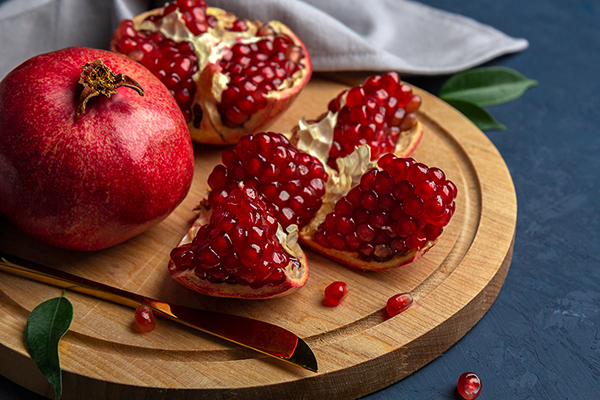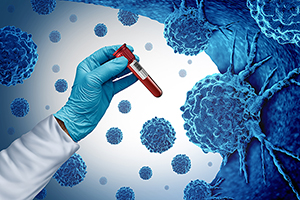



| By Dr. Ronald Hoffman

Pomegranates have long figured in mythology, sacred texts, and in ancient materia medica. (See this entertaining historical cavalcade from PomWonderful)
Modern research has documented the substantial health benefits of pomegranates: “ . . . human-based studies have shown promising results and have indicated pomegranate potential as a protective agent of several diseases.” It possesses antioxidant, antimicrobial, and anti-inflammatory properties.
Research confirms its impact on cancer, neurodegenerative disease, skin health, obesity, diabetes, Alzheimer’s Disease, osteoporosis, and dental health.
Its benefits have been attributed to a variety of its constituents. Like many red, blue, and purple fruits, it is rich in anthocyanins which have documented neuroprotective effects.
It also delivers flavanols, the selfsame compounds that endow tea with its health-protective properties. And there’s quercetin, with its anti-allergy and anti-inflammatory effects.
Pomegranates are important contributors of dietary nitrates which support nitric oxide metabolism, essential for circulation.
Also present are phenolics, like caffeic and chlorogenic acids (as in green coffee bean extract, thought to impact sugar metabolism and weight) and ellagic acid (found in strawberries, a cancer-fighter).
Unique to pomegranates are certain ellagitannins, including punicalagin, the largest and most abundant polyphenol known. Punicalagin may account for pomegranates’ substantial antioxidant effects.
Notwithstanding robust evidence for pomegranates’ disease-fighting potential, PomWonderful lost a celebrated case with the Federal Trade Commission (FTC) in 2016. The FTC slapped down their advertising which featured truthful claims about pomegranates’ ability to impact cardiovascular disease and prostate cancer—despite the company having underwritten 40 million dollars of research. So much for free speech when it comes to natural products!
Try as I might, I don’t particularly like eating pomegranates. It’s tough work extracting the fruit from its outer coating, and the seeds stick in my teeth.
There’s the option of drinking pomegranate juice, but care must be taken because many commercial brands—even the “natural” ones—are diluted with grape juice concentrate, which delivers a dollop of unnecessary sugar.
PomWonderful, the most popular brand, is 100% pomegranate, with no added sugar. But those desirous of curtailing their simple carbohydrates should be aware that an eight-ounce serving delivers 160 calories of which 34 grams are (natural) sugars.
My solution is to add a generous splash of pomegranate juice to seltzer over ice to make a Pom spritzer.
But there’s a new wrinkle to the pomegranate story. A pomegranate-derived substance called urolithin A is generating a buzz.
Urolithin A is not properly a constituent of pomegranates. It’s a byproduct of bacterial fermentation in the gut. The bioavailability of ellagitannins and ellagic acid in pomegranates is very low. These molecules undergo extensive metabolism by the gut microbiota to produce urolithins that are much better absorbed.
The following studies about urolithin A are garnering attention:
While human trials are scant, there’s promising evidence that urolithin A may ultimately complement the pantheon of acknowledged mitochondrial support nutrients such as NTFactor®, nicotinamide riboside, coenzyme Q10, L-carnitine, D-ribose, and Pyrroloquinoline quinone (PQQ).
The hook for me is that urolithin A might enhance athletic performance and endurance. A clinical trial is underway involving elite runners age 18-40. I’m constantly on the lookout for that added boost to power my mitochondria through summer race season.
The research has spawned the direct-to-consumer launch of a standardized urolithin A extract, Mitopure™️. It delivers research-validated doses of urolithin A in either powder or capsule form.
NOTE: Intelligent Medicine was not compensated for this article by any commercial entities producing or selling pomegranate products. Other supplement links within the article may include our longtime, trusted partners.
Though we think of declining estrogen as the hallmark of menopause, it's actually common for…

Up to 12 percent of Americans have ulcers at some point in life. Peptic ulcers…
Gallbladder disease is a modern illness. An estimated 20 million Americans have gallbladder disease. The…

These days, you can walk into a doctor’s office and request tests that will highlight…

Q: I'm trying to include more fresh produce in my diet, but I'm worried about…

On a recent episode of Intelligent Medicine, I highlighted a study that demonstrated that an…

Extending Life: Chris Mirabile Discusses Strategies to Combat Aging, Part 1

Our virtual voicemail is open 24/7, so there's no need to wait to submit your questions for Dr. Hoffman. Leave a message, and you may hear your question featured on the Intelligent Medicine radio program!